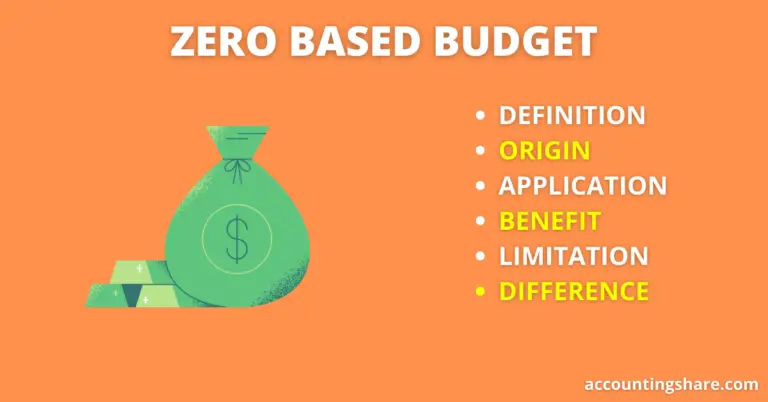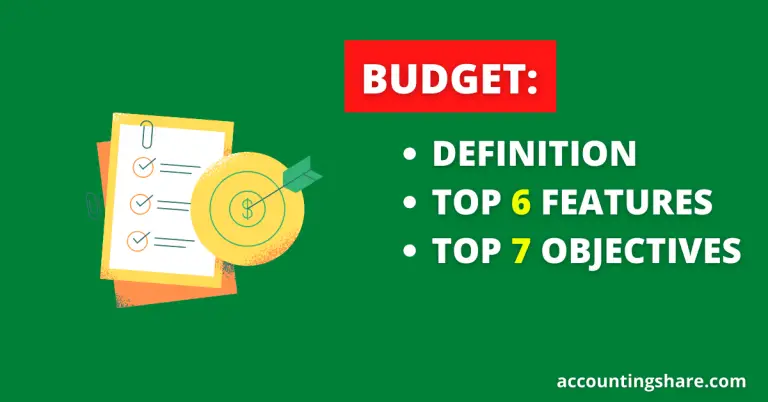Budgetary Control: Definition, Features, Objectives, Importance, and Elements [Notes with PDF]
In this post, we will learn in detail about Budgetary Control including its definition, features, objectives, importance, essential elements or prerequisites, and much more.
What is Budgetary Control?
Budgetary control refers to a budget-based control.
When the budget is used as a tool of planning and control to carry out all of the functions of the business correctly, and the actual results are regularly compared with the budget and remedial control orders are issued as needed, this method is called budgetary Control.
Budgetary control is a system of controlling costs which includes the preparation of budgets, coordinating the departments and establishing responsibilities, comparing actual performance with that budgets acting upon results to achieve maximum profitability.
Brown and Howard
In the budgetary control system, the budget plays an important role in both planning and control. In budgetary control, predefined budget allocations are used as criteria or standards to measure actual results.
Features of Budgetary Control:
Analyzing the definition of budgetary control, the following are the features of budgetary control:
- One of the features of budgetary control is to formulate a budget for the purpose of implementing the plan.
- It includes defining executive responsibilities through the budget and allocating resources.
- Implementing the budget through the personal efforts and actions of the executive officers is another feature of budgetary control.
- It is an important aspect of budgetary control to consistently compare the standard set by the budget with the actual results.
- One of the features of budgetary control is to analyze the causes of any deviation by comparing the actual results with the budget and to take remedial action.
- Another feature of budgetary control is the use of budgets as planning and control strategies.
Objectives of Budgetary Control:
Budgetary control systems have been introduced for three main purposes.
The following are the important objectives of budgetary control.
1.Planning:
The first objective of budgetary control is planning. The primary goal of business is to make a profit, and making a profit necessitates a well-thought-out plan.
The budgetary control system provides a numerical description of a well-planned activity to show the business the best way to achieve a specific goal, such as how much to produce and sell, how much to spend on raw materials, labor, and other sectors, and how much profit can be made.
2. Co-ordination:
It is necessary to coordinate the functions of the company’s various departments to achieve business objectives.
One of the primary goals of budgetary control is to coordinate the functions of various business departments.
On the basis of mutual cooperation, different departments must collaborate to achieve the same goal. It is irrational for the production department to produce goods that the sales department will not be able to sell.
If the manufacturing engineering department invents very high-quality products without considering the cost, they may not be for sale at a higher price.
In the budgetary control system, before approving the budget, the budgets proposed by each department are judged together and necessary adjustments are made.
Such budget-based coordination of various functions is important to the organization’s success.
3. Effective control:
The main objective of budgetary control is an effective control. Budgetary control is more effective than other types of control.
Because it expresses the plan in numerical criteria and collects and compares the actual results on an objective basis.
It is important to note here that the budget does not automatically function as a control mechanism. Only through good coordination and budget management will management be able to use the budget as a tool.
In addition to the above three main objectives, the following are some of the objectives of budgetary control:
1.Decentralization of power:
The responsibilities and duties of the staff and officers under budgetary control are specified and they are given the appropriate authority to perform the duties and responsibilities in order to achieve the set targets by formulating the budget.
This facilitates the decentralization of power in the budgetary control system.
2. Increase efficiency:
Increasing the efficiency of employees is one of the objectives of budgetary control.
In the budgetary control system, the standards of performance are set and the responsibilities of each staff, executive, and department are specified and they are supervised and monitored.
As a result, every employee and executive officer tries to increase their work efficiency by performing their duties properly.
The Institute of Cost and Works account of England and Wales outlines the following objectives of budgetary control:
- Planning and control of income and expenditure related to production and business for maximum profit.
- Planning and control of capital expenditure.
- Planning and control of liquid resources and working capital.
- Planning and control of research and development expenditure.
- Decentralization of power and use of the budget as a management tool.
Importance of Budgetary Control:
The importance of budgetary control in management is immense. Budgetary control not only organizes the overall control system of the organization but also serves as the basis for planning.
It also plays an important role in coordinating within the organization by establishing links between the planning and control systems of different departments of the organization.
The importance of budgetary control measures is discussed below:
1.Basis of financial planning:
The budgetary control system helps to lay the foundation for the financial planning of the organization.
The programs adopted in the current financial plan are based on the information obtained from the methods adopted in the past.
The success of financial management depends on the effectiveness of budgetary controls.
2. Increase efficiency and reduce waste:
Budgetary control increases the overall efficiency of the organization and reduces waste through various criteria and the division of responsibilities and duties among employees and officials.
3. Helps to achieve goals and objectives:
Goals are set through the budget. Budgetary controls help achieve these predetermined goals.
Thus budgetary control plays an important role in achieving pre-determined goals and objectives.
4. Helpful for co-ordination:
In the budgetary control system, the overall budget is prepared through the formulation of various functional departmental budgets.
This overall budget helps in coordinating the work of different departments.
5. Delegation of authority:
In the budgetary control system, authority is delegated along with the distribution of various responsibilities and duties among the employees and officials.
As a result, it is possible to perform duties and responsibilities properly through full use of authority or power.
6. Overall control:
In the budgetary control system, different work-based budgets are formulated for each department. Criteria are also set for the objectives of each budget.
Deviations are made by comparing the actual work with the criteria and remedial action is taken. As a result, overall control of the organization is possible under budgetary control.
7. Maximizing Profit:
Increasing management efficiency and effective control in the budgetary control system results in minimizing expenditure, waste, and losses.
As a result, the organization will be able to maximize its profits.
Essentials Elements or Pre-requisites for Introduction of Budgetary Control System
In order to successfully implement a budgetary control system in an organization, some essential elements or prerequisites need to be considered. These essential elements or prerequisites are discussed below:
1.Taking initiative:
In order to successfully implement and introduce a budget control system in any organization, the top management has to take initiative first.
Achieving other objectives including maximizing the profits of the organization requires the initiative of senior officials for formulating sound and practical plans, formulating budgets, comparing actual results with budgets, taking remedial measures, etc.
2. Setting realistic objectives and goals:
In order to make the budgetary control system successful, it is necessary to set realistic objectives and goals.
If the objectives and goals are not realistic, it is not acceptable to the staff and officials. As a result, it is not possible to implement it.
3. Establishment of Responsibility Centers:
In order to introduce a budgetary control system, each department of the organization is considered a responsibility center.
The responsibilities of the production department, sales department, purchasing department, investment department, accounting department, administration department, etc. will be vested in their respective departments and they will not have to fulfill the responsibilities of any other department except the department.
4. Distribution of powers and responsibilities among the officers and management executives:
In order to make the budgetary control system effective, responsibilities and duties are precisely distributed among the officers and executives working in each responsibility center.
As a result, there is no tendency to avoid responsibility or evade work.
5. Effective communication and coordination:
In order to have effective budgetary control, communication between the senior and subordinate officers and employees of the organization, in addition to creating cordial relations, proper coordination in the work of each department is very important.
6. Budget Education and Concepts about Budget and Budget Control:
One of the prerequisites for the successful implementation of the budgetary control system is that everyone from top management to general staff should have theoretical, technical, and practical knowledge about budget, budgeting, and budgetary control.
Seminars and workshops on budget and budgetary control will be conducted to inform all concerned about the benefits of budget control, theoretical knowledge, etc.
Everyone will be encouraged to implement a budget control system.
7. Continuous monitoring:
In order to keep the budgetary control system running smoothly, it is necessary to prepare a report on the work done in a timely manner and compare it with the pre-determined targets.
In this way, the maximum benefit of budgetary control can be obtained through budget reporting.
8. Responsible accounting management:
The responsible accounting system is required for the budgetary control system.
Through a responsible accounting system, each responsible department and center takes care to set targets and achieve the set targets.
9. Flexibility:
Budgetary control systems need to have sufficient flexibility in the budget.
In view of the changed situation, the departmental managers can try to take maximum advantage of the situation by changing the targets set in the budget as required.
10. Spontaneous participation of all officers and employees:
Spontaneous, active participation and sincere cooperation of all levels of officers and employees are essential for the successful introduction and effective implementation of the budgetary control system in the organization.
you can also read:




THIS HAS BEEN VERY INSIGHTFULL